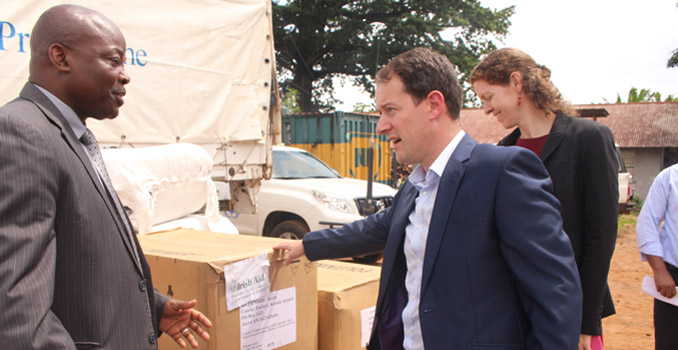Ireland’s response to the Ebola crisis in West Africa
The continuing spread of Ebola in West Africa is a matter of grave concern. Ireland is playing its part in stopping the spread of this deadly virus.
Already more than 15,000 people are reported to have been infected and the World Health Organisation has warned of an exponential increase in cases over the coming months. It is essential that the international community does everything it can to assist the affected communities and support the health services in the affected countries as they address this outbreak.
West Africa has been devastated by the Ebola crisis. When the virus has eventually been defeated, the countries most affected will need our generous and ongoing support to help them recover. Ireland is providing over €17 million in the region annually, directly and through NGOs. Our programmes in Sierra Leone and Liberia are focused on strengthening health systems and we have reprogrammed other funding directly to the Ebola response. In addition to strengthening the countries' health systems, Ireland's funding supports efforts to tackle and contain the Ebola outbreak. Our funding provides beds, ambulance services, vital nutrition to children, blankets, water tanks, medical training, and public awareness campaigns. We are urgently looking at what more we can do.
Ireland has provided direct funding to date of almost €17 million to organisations working on the Ebola response in Sierra Leone and Liberia
Most recently, Ireland provided over €220,000 to Plan (UK) which will support families in Sierra Leone who have been quarantined as a result of Ebola by providing food packages, fuel and other vital supplies including soap and cooking utensils. This support will help to reduce transmission of the disease by encouraging communities to work with the authorities to isolate potential cases.
Ireland also dispatched 42 tonnes of practical equipment, to be distributed to affected communities, including:
- blankets,
- tarpaulin,
- tents,
- mosquito nets,
- soap,
- jerry cans, and
- water tanks
Ireland is also contributing much needed human resources with public health specialists from the Department of Health having served with the World Health Organisation in Nigeria and Liberia in August. A member of the Irish Aid Rapid Response Corps, was recently deployed to Dakar, Senegal to work with the World Food Programme to set up an air transit centre for use by the UN Humanitarian Air Service.
Ireland’s Embassy in Freetown is playing a key role in local coordination
Colleagues in our embassy in Freetown are working closely with the local authorities and international partners to identify what assistance is most needed to try to manage the current outbreak, to support the local health and government infrastructure, and to prevent further spread of the virus. Our Embassies in Freetown and Abuja are in ongoing contact with registered citizens, ensuring they are aware of the precautions necessary to ensure their health and safety and providing regular updates to our travel advice in line with international best practice.
The HSE has published an information note for international health workers on Ebola.
We continue to update our travel advice on the Department’s website for all affected countries.
Citizens Registration
We are asking all those in the affected area to register on our Citizens Registration page at www.dfa.ie/travel

